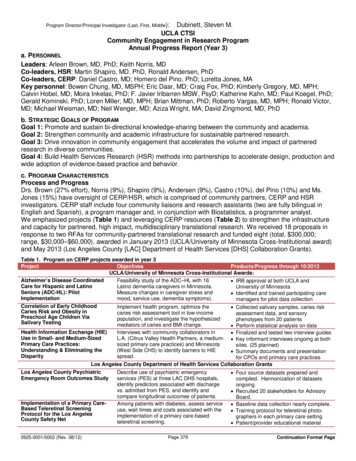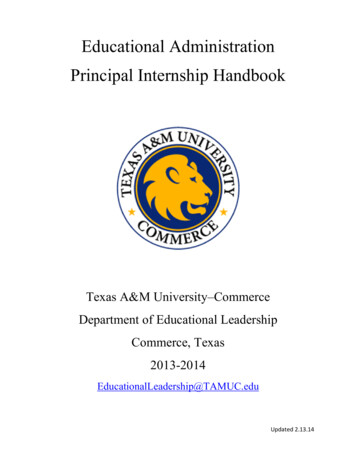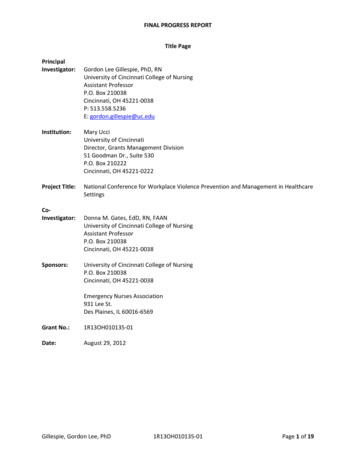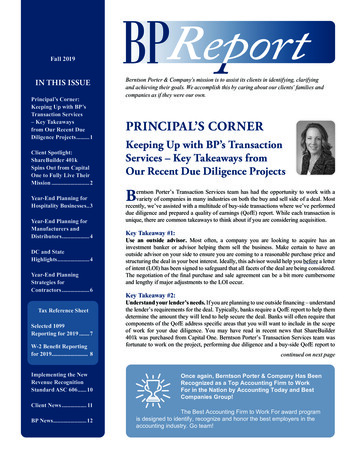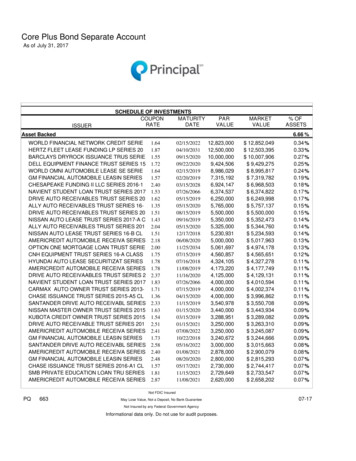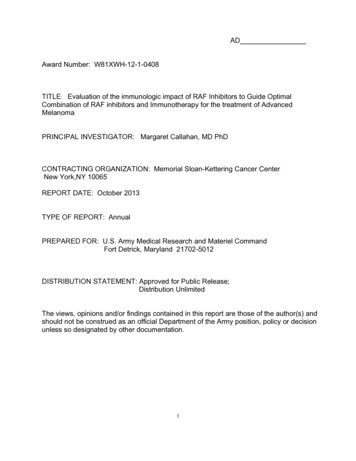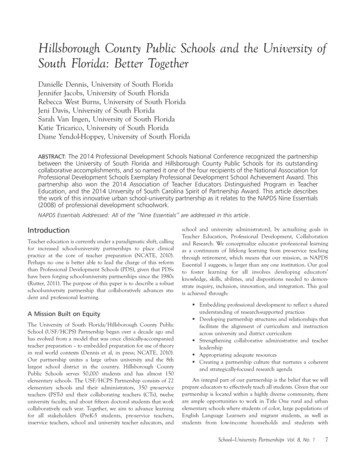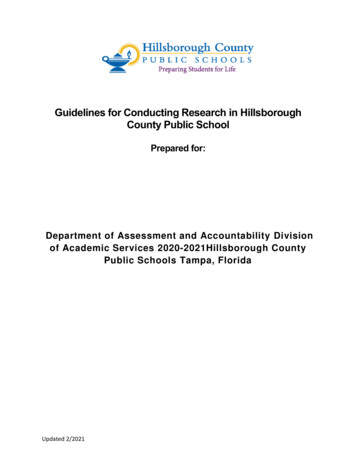
Transcription
FOCUS PRINCIPAL LEARNINGHILLSBOROUGH’SPRINCIPALPIPELINEALIGNED LEARNING STRENGTHENS LEADERSHIP IN FLORIDA DISTRICTBY TRICIA McMANUSThe path to principalshipin Hillsborough CountyPublic Schools in Floridais not one taken lightly.After receiving the WallaceFoundation Principal Pipeline Initiativegrant, Hillsborough was one of sixdistricts that developed a comprehensiveprincipal pipeline based on four keycomponents: leader standards that definethe role of principal, quality selectionand preservice training practices,effective hiring practices, and on-the-36job evaluation and support to providecoaching and ongoing professionallearning.To become a principal, teachersmust first obtain EducationalLeadership Certification and enter theHillsborough Principal Pipeline. Afterserving as an assistant principal andsuccessfully completing the PreparingNew Principals program, they can bematched with a principal vacancy. Buteven after they become a principal, theirprofessional learning continues.The Learning Professional www.learningforward.orgAs the district’s assistantsuperintendent of educational leadershipand professional development anda former principal, I have a directview into the efforts the district hasundertaken to elevate and improveprofessional learning. Historically,Hillsborough’s professional learning forinstructional leaders was described as aone-size-fits-all, sit-and-get experience.There was virtually no follow-up onprofessional learning. The district lackeda formalized mechanism for gaugingJune 2017 Vol. 38 No. 3
When professional learningis relevant, timely, andhigh-quality — meaningthere is follow-throughand coaching support inthe field — it has a directimpact on principal practice,which leads to improvedteacher practice and studentlearning.professional development’s impacton improving principal, teacher, andstudent outcomes. Principals had littleaccess to coaching and were limited inwhom they could go to for support.That changed when the FloridaDepartment of Education awarded thedistrict an Instructional Leadership andFaculty Development grant to developand implement a one-year professionallearning pilot program for principalsthroughout the district for the 201516 school year. The model, LeadersEngaged in Accelerating Performance,or LEAP UP, aligns individualprincipals’ professional learning needswith strategies designed to addressJune 2017 Vol. 38 No. 3challenges unique to each district area.Area leaders, a largely managerialrole, became area superintendentsresponsible for supervising schoolleaders and strengthening theirpractice in instructional leadership,managing and developing people, andbuilding relationships. With this shift,Hillsborough redesigned principalnetwork meetings to allow for principalprofessional learning and collaboration.MODEL FOR SUCCESSLEAP UP’s goals were twofold.First, the aim was to provide principalswith relevant, timely meetings toimprove their practice throughaligned learning goals and jobembedded learning. The second goalwas to provide area superintendentswith autonomy while at the sametime shifting their role to focus onsupporting principals’ professionallearning.LEAP UP’s implementationincorporated input from the chiefof schools, the executive director ofleadership and development, areasuperintendents, and principal coaches.Intended outcomes included:1. Area superintendents andprincipal coaches will provideguidance and support toprincipals in discovering andwww.learningforward.org The Learning Professional37
FOCUS PRINCIPAL LEARNING2.3.4.5.6.7.8.38writing the two competencybased goals that drive eachprincipal’s professional learningfor the year.The chief of schools andexecutive director for leadershipdevelopment will support areasuperintendents and principalcoaches by facilitating a sessionto map out goals for principalsin each area, looking for trends,and planning professionaldevelopment for the year.Area superintendents andprincipal coaches will facilitatetraining for principals relatedto the areas of school culture,developing teacher practice,and improving instructionalexpertise.The chief of schools andexecutive director of leadershipdevelopment will receiveplanning, coaching, support,and guidance to ensureimplementation of professionaldevelopment, ongoingcollaboration between areasuperintendents and coaches,monitoring, and coursecorrections as needed.Principals will embed practiceslearned through area principallearning sessions into theirdaily practice with teachers andstudents.Area superintendents andprincipal coaches will usea principal goal tracker tomonitor the effectivenessof development supports inimproving instructional practiceof principals.Area superintendents andprincipal coaches will observeand coach principals while theyare working with individualteachers and groups of teacherson key focus areas.An outside consultant willEVALUATION QUESTIONSThe following evaluation strandsand questions were central to theevaluation.Progress monitoring questionsaddressed:1. To what extent were theprogram’s componentsimplemented consistently withthe program plan?2. To what extent did keyparticipants participate fully inall program activities?Formative evaluation questionsaddressed:1. What adjustments were madeto the program components?2. What were the opportunitiesfor program improvement?Program impact questionsaddressed:1. To what extent did theprogram positively influencethe target population’sbehavior?2. How likely is the program tocontinue beyond the fundingperiod?provide individual coachingand support to each areasuperintendent and principalcoach as they work withprincipals in the field andplan follow-up professionaldevelopment related to the coretopic areas.PLANNING AND DEVELOPMENTLEAP UP implementation includedthree broad phases: preplanning,planning and goal setting, and coachingand delivery. In the first phase, thechief of schools and executive directorof leadership development designed theoverall LEAP UP model for developingdistrict leaders through continuedThe Learning Professional www.learningforward.orgcoaching and professional learning. Inaddition, in preparation for LEAP UPimplementation, external consultants ledtrain-the-trainer sessions to prepare areasuperintendents and principal coaches.During the second phase, theconsultant and district leaders workedwith area superintendents to identifyand assess area priority challenges andidentify professional learning goalsfor all principals. Designed to honorthe unique character and address thespecific needs of each area, the groupdeveloped a professional learning systemfor principals based on area priorities andindividual learning needs. The consultantbegan mentoring area superintendentsand monitored their progress.In the third phase, areasuperintendents implemented smallgroup meetings and professionallearning communities (PLCs). Aconsultant observed sessions andprovided individual coaching to areasuperintendents. Because the sessionswould coincide, the consultant reliedheavily on self-reports of progress,reserving in-person session observationsfor those where the greatest needsexisted. Feedback was based on theidentified needs of each area andaccording to the key tenets of adultlearning theory.EXTERNAL EVALUATIONThe grant provided for an externalevaluation that addressed threeobjectives: monitoring LEAP UPdelivery, gauging implementationand identifying opportunities forits improvement, and determiningindicators of LEAP UP’s impact onprincipals.The evaluator’s role was to amassdata, develop credible yet timelyfindings, and provide LEAP UP leaderswith regular feedback through reports,facilitated discussion, and collaborativeinquiry. The evaluation would thusserve both as a reporting function asJune 2017 Vol. 38 No. 3
Hillsborough's principal pipelinewell as one of continuous improvement.The box on p. 38 lists the evaluationstrands and questions that were centralto the evaluation.As the district refined the programthroughout implementation, theevaluation team supplied frequentdata analysis summaries to LEAPUP’s leaders, followed by facilitatedconversations that explored theimplications of findings, redirectedor added new evaluation activities(e.g. new participants, new protocolquestions), and led to programadjustments.EVALUATING LEAP UPThe program evaluators gatheredand analyzed evidence that would beused to improve LEAP UP’s model,gauge its implementation, and assess itsimpact.The district asked the evaluatorsto facilitate a collaborative reviewprocess. To make the evaluationfindings as useful as possible, theproject put a strong emphasis onengaging key stakeholders throughoutthe process. Ultimately, the evaluationwas designed to collect credibleinformation, share findings with itsintended users in short time frames,and simplify the integration ofrelevant information into a continuousfeedback cycle for LEAP UP.The evaluation gauged the extentto which area superintendents andprincipal coaches were sufficientlyprepared, willing, and positioned toparticipate in planning, coaching, andmonitoring aspects of the program.In addition, the evaluation examinedwhether principals reported receivingthe professional learning they needed.The evaluation team used a mixedmethods approach to assess professionallearning needs, capacity, provision ofprofessional learning activities, and useof follow-up, monitoring, and supports.The evaluation also soughtJune 2017 Vol. 38 No. 31 DEFINED LEADERSHIP: Redesign jobresponsibilities for principals,assistant principals, and areadirectors toencompass newleadership standards.4 ON-THE-JOBEVALUATIONAND SUPPORT:Evaluate principalsregularly andprovide oring.2 PRESERVICETRAINING:Overhaul therecruitment,selection, andtraining processto ensure themost effectiveleaders areincluded.KEYCOMPONENTSOF THEHILLSBOROUGHPRINCIPALPIPELINE3 SELECTIVE HIRING:Recruit, hire, andpromote only the mosteffective and rtunities for improving the processand models and gauged perceivedoutcomes.COLLECTING DATAEvaluators collected data in threeways:1. Exploratory interviewsand focus groups: Earlyon, evaluators conductedunstructured and semistructured interviews with theproject director, the project’sdata manager, and the externalconsultant. Evaluators alsoconducted focus groups witharea superintendents, principalcoaches, and a sample ofprincipals.2. Thematic interviews:Evaluators conducted semistructured interviews with allprincipal coaches, a randomsample of principals, and theLEAP UP project director tohome in on topics of interest.3. Corroborative interviews:Evaluators conductedstructured and semi-structuredinterviews to gather targetedself-assessments and feedbackfrom area superintendents anda sample of three randomlyselected principals (one fromeach school level) representingeach area.Evaluators used 81 interviews orfocus groups to inform the findingsin this report. Among these, theevaluation team conducted interviewsor moderated focus groups with 46principals, nearly one-fifth of all publicschool principals in the district. Becausethe evaluators collected informationfrom so many key stakeholders acrosswww.learningforward.org The Learning Professional39
FOCUS PRINCIPAL LEARNINGareas and levels, the findings aremoderately robust.PRINCIPALS’ ASSESSMENTMost principals echoed the words ofone who said that “while the district hashistorically provided good professionallearning for principals, none came closeto this school year’s level of qualityand relevance.” Many other principalsdescribed what they called a dramaticchange from previous years’ sit-and-getexperiences to a focused learning andsupport system that includes dialogue,flexibility, and collaboration. Allstakeholders described the actionable,problem-solving orientation of LEAPUP as a marked improvement overprevious years’ professional learningsystems.Most principals said theyappreciated the plan to integratecontinuous timely and targetedimprovement feedback throughoutLEAP UP’s professional learning andthe collaboration created through PLCs.In Area 4, 83.7% (a 28.5% increase)of teachers agreed that professionaldevelopment provides ongoingopportunities for teachers to work withcolleagues to refine teaching practices.In Area 8, the main focus forprofessional learning was teacherfeedback. Principals learned fromnational expert Robyn Jackson aboutdifferentiating teacher feedback basedon a teacher’s will and skill level.This was further extended byoffering job-embedded opportunitiesto practice differentiating feedbackthrough focused principal PLCs. Duringthese PLCs, Area 8 principals learnedto fine-tune their teacher feedbackand feedback systems as they visitedschools and collaborated on the onepiece of feedback that would improveinstruction. Of the principals whoparticipated in these quarterly PrincipalPLC Feedback sessions, 71% maintainedor increased their school grade.40Feedback that was direct andtargeted to meet the needs of individualteachers was a key aspect of the grant.In Area 4, 73% of teachers agreedthat professional development wasdifferentiated to meet the needs ofindividual teachers, up from 54% in2015.In Area 8, one principal remarkedthat a challenge he has always faced wasgiving feedback to the teachers who arehighly accomplished or exemplary intheir craft.By hosting a PLC session at hisschool that focused on fine-tuningfeedback for these high performers, hewas able to collaborate with colleagueswho helped him improve his abilityto provide high-quality differentiatedfeedback to each teacher.In Area 7, all principals interviewedcommented on the benefits of theirPLC in applying the learning at theirschools.Other assessments of LEAP UPinclude: Professional learner input:Many stakeholders, especiallyprincipals, said that LEAP UPimproved the use of principalinput in the learning process.Several principals stated thathaving more input into topicchoices improved rele
in Hillsborough County Public Schools in Florida is not one taken lightly. After receiving the Wallace Foundation Principal Pipeline Initiative grant, Hillsborough was one of six districts that developed a comprehensive principal pipeline based on four key components: leader standards that define the role of principal, quality selection and preservice training practices, effective hiring .


